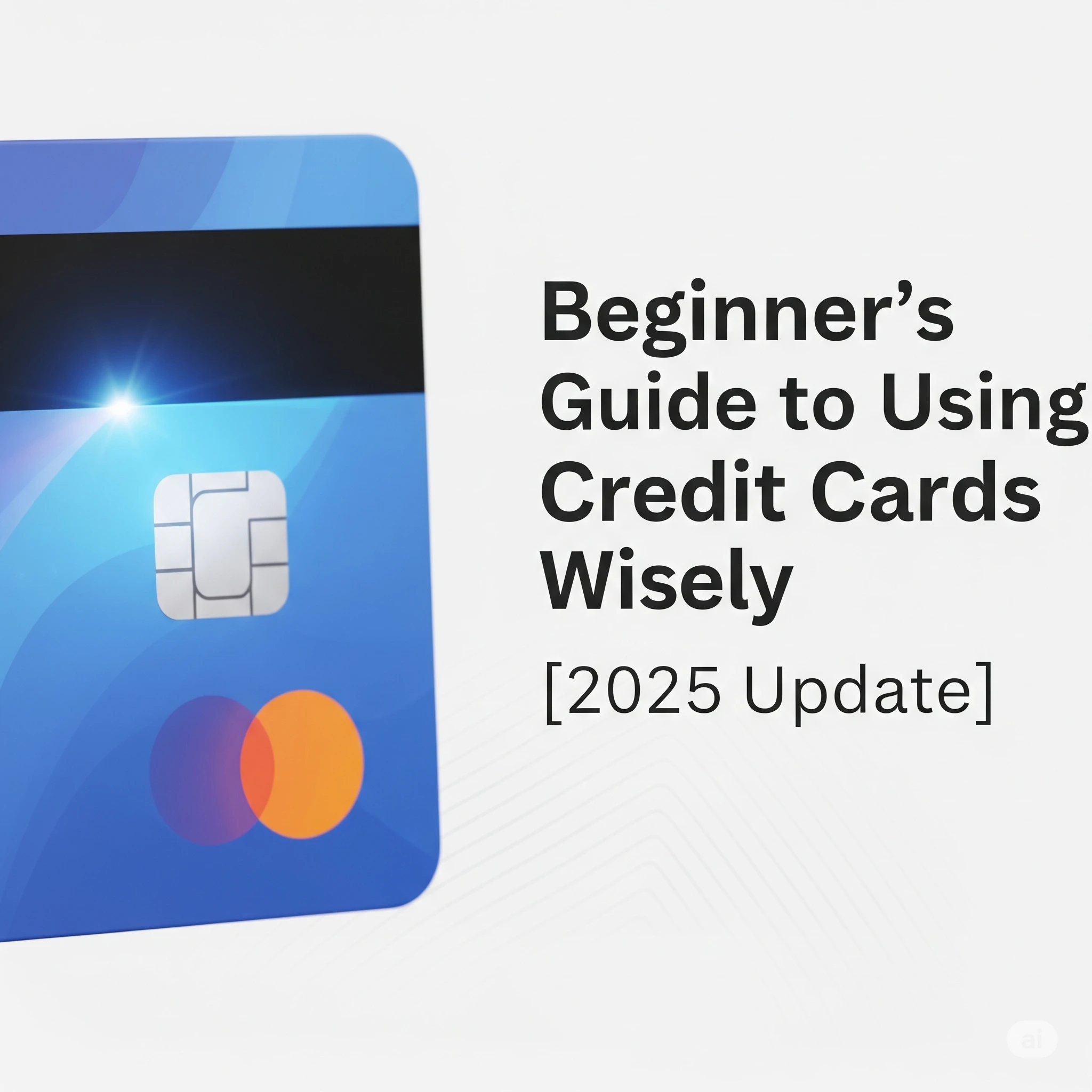How to Get a Credit Card in Tier-2 and Tier-3 Cities in India (2025): The Complete Guide
Answer up front:
If you live in a Tier-2 or Tier-3 city in India, you can absolutely get a credit card—even with no prior credit history or big city address—by using the right documentation, choosing supportive banks (SBI, HDFC, ICICI, Axis), and considering FD-backed secured cards. With digital verification and relaxed eligibility in 2025, approval is easier than ever if you follow the exact steps in this detailed guide.
Introduction: Why This Topic Matters for Small-Town India
India’s digital economy is booming everywhere—not just in the metros. From Patna to Gorakhpur, Dehradun to Warangal, millions want the benefits of credit cards: building a CIBIL score, buying online, earning cashback and rewards. But even in 2025, getting a credit card in Tier-2 and Tier-3 cities has unique challenges: local document verification, limited bank branches, and lower credit awareness. If you live outside Mumbai, Delhi, or Bangalore, this in-depth guide is crafted exclusively for you.
Table of Contents
- What are Tier-2 and Tier-3 Cities in India?
- Can You Get a Credit Card in a Small Indian City?
- Common Barriers for Credit Card Approval in Tier-2/3 Cities
- Step-by-Step Strategies: How to Get Approved
- Best Banks for Credit Cards in Tier-2 & Tier-3
- Best Document Combinations and Local Address Proofs
- Special Guide: Students & Self-Employed in Small Towns
- FD-Backed (Secured) Credit Cards: The Secret Weapon
- Digital Verification: How eKYC and Video KYC Help You
- How to Build Credit from Zero in Small Cities
- Pro Tips to Avoid Rejections (2025)
- FAQs: Tier-2 and Tier-3 Credit Card Applications
- Conclusion: Unlock Your Local Financial Power
What are Tier-2 and Tier-3 Cities in India?
Credit card eligibility and approval requirements partly depend on the city or town you live in. In 2025, India’s Tier-2 and Tier-3 cities include rapidly growing urban centers and even large towns, outside the top metros.
Examples of Tier-2 cities: Lucknow, Indore, Nagpur, Ludhiana, Patna, Guwahati, Madurai, Kochi, Agra
Examples of Tier-3 cities: Begusarai, Kurnool, Dhanbad, Beed, Jhansi, Siliguri, Anand, Karimnagar, Warangal
Key factors that matter for credit card approval:
- Bank branch presence, digital banking access
- Level of digital infrastructure (e.g., video KYC availability)
- Local address and employer verification
- Traditional vs. new-to-credit customer profiles
Takeaway: The right strategy can get you a credit card regardless of your city’s population size or infrastructure.
Can You Really Get a Credit Card in a Non-Metro City?
Absolutely yes. By using the latest digital verification, the right banks, and knowing what documents to provide, you can get a credit card in any Tier-2 or Tier-3 city in India in 2025—even with little or no credit history.
- Most major banks (SBI, HDFC, ICICI, Axis): Consistently issue credit cards to applicants outside metros.
- PSU and cooperative banks: State banks (and some growing private banks) extend credit products across smaller towns.
- Secured credit cards: FD-based cards are available everywhere, for those lacking income slips.
- Digital banks and fintechs: Many offer 100% online application and approval, reducing reliance on physical infrastructure.
Even if you face initial rejections, the strategies in this guide can get you approved.
Common Barriers Faced by Tier-2 and Tier-3 Applicants
- Address Proof Issues: Banks may not recognize rental agreements or utility bills in semi-urban areas if not in major town names. Some require extra documentation.
- Income Documentation: Many aren’t salaried—they are small traders, gig workers, tutors, etc. Traditional salary slips may be missing.
- Low/No Credit History: Most small-town youth are “new-to-credit” and have not borrowed or used formal credit yet.
- Limited Bank Branches: Some private banks have fewer branches, making document collection and verification slower.
- High Scrutiny in Physical Verification: Banks may do home/office visits to verify address or employment, which can feel intimidating.
- Lack of Guidance: Bank staff in Tier-2/3 cities may be less aware of new credit card policies; applicants often receive confusing or conflicting advice.
Expert Tip: Most barriers can be overcome with the right preparatory work and by choosing banks more active in your city or district.
Step-by-Step Strategies to Get Your First Credit Card (2025)
-
Start with Banks Where You Hold a Savings Account:
Banks prioritize existing customers—they may even offer “pre-approved” cards based on your account history in Tier-2/3 towns. Maintaining an active savings account boosts your chances considerably. -
Gather All Address and Identity Proofs:
Provide 2-3 address proofs if possible (Aadhaar, Voter ID, utility bills, rent agreement, ration card), as rural/semi-urban documents sometimes need manual validation. -
Show Consistent Bank Statements:
Even if you are self-employed or a student, a bank statement showing regular deposits (scholarship, tuition, small business turnover) for the last 6–12 months is very persuasive. -
Consider Applying for a Secured (FD-Based) Credit Card:
These cards are nearly always approved regardless of city or employment status. Minimum FD starts at ₹10,000–₹20,000, and cards like SBI Advantage Plus, ICICI Instant Platinum, and Axis Insta Easy are best-suited for smaller cities. -
Leverage Digital/Video KYC:
Choose banks that offer eKYC or Video KYC—this reduces physical branch visits and speeds up approval, even if a local branch is not nearby. -
Seek Assistance from Local Bank RMs or Bank Mitra Agents:
They understand local requirements and can escalate genuine applications. -
Apply During Salary Credit Season or After Income Tax Filing:
If you're employed, apply just after your annual increment or after filing Income Tax Returns, when your income looks strongest. -
Be Ready for Physical Verification:
Ensure someone is present at your address for the verification call or visit.
Best Banks for Credit Cards in Small Cities & Towns (2025 List)
- State Bank of India (SBI): The go-to for semi-urban applicants, known for broader branch reach and flexible documentation.
- ICICI Bank: Very strong FD-backed “Instant Platinum” secured cards and regular cards through digital verification.
- HDFC Bank: Extensive rural presence, supports digital KYC and multiple document types.
- Axis Bank: Consistent in mid-sized cities, online and offline application options.
- Federal Bank: Popular in Kerala and adjoining states, good at integrating digital and local verification.
- IDFC First Bank: Among private banks, rapidly expanding in Tier-2, lesser documentation burden.
Regional Rural Banks (RRBs), cooperative banks, and small finance banks rarely issue credit cards—they usually offer only debit/ATM cards.
| Bank | Does it Issue Cards in Small Cities? | Secured Card Option? | Digital Application? |
|---|---|---|---|
| SBI | Yes, very active | Yes (SBI Advantage Plus, Unnati) | Yes (YONO App, online forms) |
| ICICI | Yes, strong in towns | Yes (Instant Platinum) | Yes |
| HDFC | Yes (branches in all states) | Yes (various types) | Yes (netbanking, smart app) |
| Axis | Most Tier-2/3 cities | Yes (Insta Easy) | Yes |
| IDFC First | Expanding fast | - | Yes |
Add your local city in the search: “SBI credit card [your city]” for specific eligibility and offers!
Best Documents & Proofs for Faster Credit Card Approval
For Tier-2/Tier-3 city applications, submit multiple types of the following to avoid delays:
- ID Proof: Aadhaar, Voter ID, PAN card, Passport
- Address Proof: Utility bill, rent agreement, voter ID, or Gram Panchayat certificate (some banks accept it)
- Income Proof (any one): Latest salary slips, 6-month bank statement, income tax return (ITR), scholarship receipts (for students), business registration (for shop owners)
- Professional Proof (optional): Company ID, GST registration, education certificate
- Local Verification: Ensure your phone number is active and your home address accessible for physical or tele-verification
Expert tip: If your city or town is new/expanding, ask your bank if they cover your pin code or municipal area.
How Students and Self-Employed in Small Towns Qualify (2025)
For Students:
- Apply for student credit cards via campus tie-ups or student plans (SBI, ICICI, HDFC).
- Show education proof/admission letter and consistent account credits (stipends, scholarships).
- Consider add-on cards on parent/family accounts if available.
- If rejected, opt for a secured card (FD-based)—no income/salary slip required.
For Self-Employed / Gig Workers / Small Shop Owners:
- Show GST, Udyam Aadhar, or trade license as business proof (if available).
- If income is seasonal/irregular, use ITR and 6-12 month bank statements.
- Apply for secured cards against an FD as the surest route.
- Highlight digital payments record (QR, UPI settlements can prove regular cash flow for new-age banks).
Pro tip: For rapid approval, open an FD + apply for a secured card in your home branch. Most banks process this within 2–5 days even in smaller cities.
Secured / FD-Backed Credit Cards: Best Choice for Small Cities in 2025
Secured credit cards (issued against an FD) are almost guaranteed to be approved anywhere in India—including Tier-2 and Tier-3 towns—no matter your salary or job profile.
- Minimum FD: usually ₹10,000–₹20,000
- Minimal documentation, no prior credit history needed
- Examples: SBI Advantage Plus, ICICI Instant Platinum, Axis Insta Easy
- Helps you start building your credit score
- If you pay bills on time for 6–12 months, banks offer you a regular unsecured card—and release the FD
Why this works best for Tier-2/3 applicants: You bypass most salary, job, and address hurdles. Approval depends on your FD, not your employment.
Digital Approval—How KYC and eKYC Make Things Faster in 2025
- Most leading banks let you complete most formalities via online KYC (Aadhaar-based verification, video calls, and e-signature) in 2025.
- No need to wait for branch managers or local staff if you use YONO (SBI) or net banking (ICICI, HDFC).
- Many fintechs and neo-banks (like Fi Money, OneCard, etc.) use all-digital application and verification—usually faster than physical branches.
- Maintaining updated Aadhaar/mobile and regular digital transactions boosts instant eKYC success in small towns.
Pro Tip: If your city has weak broadband, request a phone-based alternate KYC from the bank—most offer backup processes in Tier-2/Tier-3 cities.
How to Build Your Credit Score from Zero in Tier-2/Tier-3 India (2025)
- Start with a secured card, even with minimum FD.
- Use the card each month for essential purchases (bills, online shopping, groceries).
- Repay your card bill in full before the due date—avoid late payments at all costs.
- Check your credit score quarterly on trusted websites (CIBIL/Experian/CRIF services)
- After 9–12 months of smooth usage, apply for a regular credit card (unsecured) and increase your credit limits by negotiating with the bank.
- Never use more than 30% of your credit limit in one month—for example, if your limit is ₹20,000, don’t use more than ₹6,000 monthly for the best CIBIL score growth.
- Build multiple credit relationships if possible—start with a secured card, then add a small personal loan or EMI purchase after 6 months.
Expert Tips to Avoid Rejection in Smaller Cities
- Ask the bank to pre-check your pin code and address for credit products.
- Clarify what local documents work—many banks are now accepting digitized versions from Gram Panchayat and local civic bodies.
- Be present for home or office verification calls/visits (often mandatory in Tier-2/3 areas).
- Don’t submit fraudulent job or income proofs. FD-based secured cards remain a 100% safe fallback.
- If a private bank is being rigid, try the PSU route—SBI/PNB/BOB branches are sometimes more flexible.
FAQs: Getting Credit Cards in Small Indian Cities
- Is it harder to get approved in a small town versus a metro?
- Yes, especially for first-timers and non-salaried applicants, but the right documentation and approach almost always work with PSU/private banks.
- Which is the easiest card to get in a Tier-2/3 city?
- Any secured, FD-based card—even with a minimum ₹10,000 deposit—is fast and usually guaranteed.
- What’s the fastest way to a high credit score if starting locally?
- Get a secured credit card, pay bills on time for 12 months, and request an unsecured “upgrade” with a higher limit.
- Can students, gig workers, or homemakers in small cities get credit cards?
- Yes—via student plans, FD-based secured cards, or as add-ons to family cards, provided they have account history or sufficient documentation.
Conclusion: Power Up Your Finances from Any Town in India
No matter where you live—Dehradun, Agra, Nashik, or Siliguri—you can absolutely get approved for a credit card in 2025 with the right steps. Big city addresses or jobs are NOT required; smart documentation and secured card options put you on a path to a strong credit score and financial freedom. Start with your own bank, consider secured cards, keep your digital and physical documents ready, and be patient—soon, you’ll have the power and flexibility a credit card brings, no matter how small your city or town.
Want help picking the right card or preparing documents? Contact CreditPlanner.in for custom advice—because India’s smallest cities deserve the biggest financial dreams.


